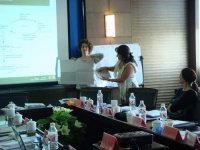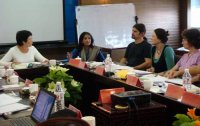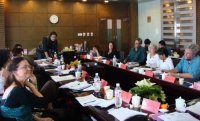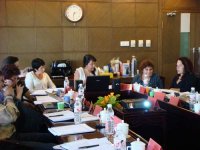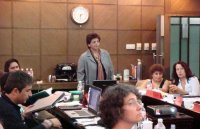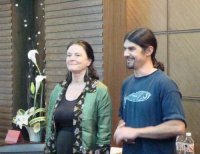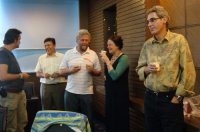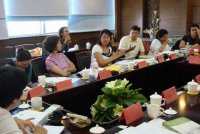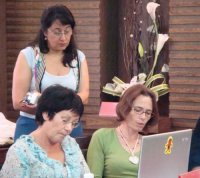
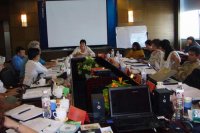
Publié le 27 novembre 2008
Traductions disponibles en :
Outcome Meeting - International Charter Committee
par Edith SIZOO
23-29 sept. 2008, Changchun, China
![]() Participants
Participants
![]() Hosts and place
Hosts and place
![]() programme
programme
![]() Outcome of the discussions
Outcome of the discussions
![]() Strategic note
Strategic note
![]() Assessment of existing activities
Assessment of existing activities
![]() 1. Strategic plan
1. Strategic plan
![]() 2. Reaching levels of expansion and regularisation
2. Reaching levels of expansion and regularisation
![]() 3. Filling the gap
3. Filling the gap
![]() 4. The search for additional funding
4. The search for additional funding
![]() To conclude
To conclude
PARTICIPANTS (in alphabetical order)
Pinky CASTELO-CUPINO PHILIPPINES
Tsisso CHIPASHVILI GEORGIA
Diego ESCOBAR DIAZ COLOMBIA
Nina GREGG UNITED STATES
Victor GRBIC NEW ZEALAND
Betsan MARTIN NEW ZEALAND
Isis de PALMA BRASIL
Angela PINO ARGENTINA
Fabienne PRESENTEY CANADA
Cécile SABOURIN CANADA
Behrouz SAFDARI IRAN / FRANCE
Edith SIZOO NETHERLANDS / FRANCE
Sudha SREENIVASA REDDY INDIA
John STEWART ZIMBABWE
Gustavo MARIN FRANCE
Lydia NICOLLET FRANCE
Vassilis ZIAKAS GREECE
ZHAO Yifeng CHINA
HOST AND PLACE
The fourth meeting of the International Charter Committee was hosted by Professor ZHAO Yifeng and took place at the Faculty for the study of Asian Civilisations of North East Normal University in Changchun, China. Professor ZHAO Yifeng, assisted by his charming and efficient MA student YU Fang, has been the most perfect host one can imagine. He took care that - outside meeting hours - we could meet a variety of interesting Chinese intellectuals. He also invited Edith Sizoo to give a well attended lecture at his Faculty on her recently published book “Responsibility and Cultures of the World”. His most appreciated talent to combine perfect organisation and conviviality greatly contributed to our well-being and the fruitful results of our deliberations.
PROGRAMME
The main items on the programme were the following
I. VISUAL PRESENTATIONS of Charter Activities in various countries (videos ; CD’s, Power Point, etc.)
II. WHAT HAS BEEN ACCOMPLISHED II.1. Assessment of what was accomplished in the country/region of each member of the International Committee. II.2. Assessment of what we aspire to create and accomplish as an international initiative. II.3. Assessment of global communication within the facilitation team.
III. PROSPECTS FOR REGIONAL / INTERNATIONAL COLLABORATION, such as a. State of affaires of Brazilian International Children/Youngsters Conference “Let’s take care of the Planet”. b. Activities from one area that can be replicated in another c. New initiatives we could partner on d. Producing a book presenting the latest philosophy and ethics of responsibility (worldwide)
IV. FINANCING PROSPECTS FOR THE FUTURE. a. Discussion on prospects for collective funding
The meeting in China could be characterised by the realization that after five years of setting up a great variety of activities aiming at exploring the feasibility of promoting a Culture of Responsibility and the Charter of Human Responsibilities as an expression thereof, time had come to develop a long(er) term strategy.
In October 2003 the members of the Committee met for the first time in Syros to discuss the idea of promoting the Charter in their own countries. In January 2005, during its meeting in Chile, the Committee exchanged its first experiences with introducing the Charter in the various contexts. In October 2006 the meeting in South Africa was devoted to the results of an internal evaluation of progress made and of the various methodologies used.
Before leaving for China, Edith Sizoo and Gustavo Marin had a long discussion with Pierre Calame on the prospects for the Charter initiative. His concerns appeared to be two-fold : on the one hand he wondered how the various initiatives developed in the fifteen countries where the members of the International Committee are active, do fit in a strategic view on the process. His other concern was the coherence across all programmes supported by the FPH, a desire to create alignment with responsibility in all of them.
Strategic note
The Charter Committee was most thankful to Pierre Calame that he made available to the Committee his thoughts on a strategy for change, as formulated in his book to be published in 2009 entitled “De l’économie à l’oeconomie”. On the basis of Chapter 5 of this book, Edith Sizoo formulated a Strategic Note (see ANNEX) that proved to be a stimulating reference point from the beginning to the end of the meeting.
When assessing what has been accomplished at national, regional and international levels, and examining prospects for future collaboration across the regions, the Committee felt that the question to the Committee to make explicit how its activities fit into a conscious methodology to promote the Charter and realize a strategy for change was a timely one.
Assessment of existing activities
As a start, the members of the Committee who were present at the meeting presented their Charter work by using Pierre Calame’s conceptual ideas on a strategy for change as a reference for analysis and for giving impetus to building institutional and legal forms of responsibility.
The exercise of presenting current activities in terms of ultimate objective, specific objectives, which activities, with whom, which allies, how, levels of society, time perspective, and snowball effect, brought to the fore not only to what extent these activities already respond to a strategic approach, but also where the blank spots are.
It also clearly showed how our ways of working on ‘Responsibility’ are interlinked with theory and practice of ‘governance’ and ‘alternatives to development’.
During the second part of the meeting, we discussed four main areas of action for the Committee as a whole.
We decided to work out an imaginative plan that will integrate a common VISION and STRATEGY with the various ensuing ACTIONS at local, regional and global levels in the coming years. A strategic plan is a way to bring unity to an operation, a voyage, which has diverse elements – in this case diverse actors, regions, contexts.
The plan is meant to bring our work further in a consciously strategic way and to make explicit to what extent the ongoing process is already strategic.
It means that we will continue and build on those - often innovative - approaches that have proved to be useful and disregard those without perspective. Thus we intend to move further beyond present boundaries and into more influential levels of society.
We have agreed on a time schedule and a plan of work in order to produce this strategic plan in a collective way. It is intended to be ready in the English version by September 2009 while the French version should be ready for submission to the Board of the Fondation Charles Léopold Mayer by the end of October 2009.
2. Reaching levels of expansion and regularisation
Pierre Calame makes a distinction between four categories of actors : innovators, constructors of doctrines, generalists and regulators.
Innovators practice a new idea, but tend often to be obsessed by the application of that idea only and do not insert it in a more general analysis of what is wrong in the world around them on which a more general strategy for change could be based.
Constructors of doctrines do try to make that sort of analysis, but are often not strong in formulating the practical implications of it.
Generalists are those who are in the legitimate position to introduce what is done at a lower level to a higher level. They are the key people to expand an activity, but they have to rely on the preparatory work of the innovators and constructors of doctrines.
The regulators (usually in government) are those who make sure, through rules, that an expanded activity gets institutionalised, i.e. accepted as normal. They cannot work without the other three types of actors just mentioned.
Although these distinctions proved to be useful, we noted in the “strategic analyses” we made of our programmes and activities that promoting a culture of responsibility often implies that the same relevant actors assume multiple roles. It is clear that our activities are marked by “innovators” and “builders of doctrines” as introducing the idea of a Charter of Human Responsibilities is in itself innovative.
Although in some of the countries where members of the Charter Committee are active, people who fulfil the function of “generalists” have effectively been reached and became involved, more emphasis will have to be put elsewhere on expanding activities from lower levels to a larger/higher ones.
We noted that the major concern and challenge, however, remains the question of how to involve the “regulators”, the higher institutional levels.
There are good examples among the present activities of the members of the Charter Committee of involving governmental agencies in their programmes (e.g. the Across Oceania program in the Pacific) and even of making them the motors for change (like the Environmental Education program in Brazil that has now become centred around the notion of responsibility. However, reaching the stage of regulation of responsibilities by governmental agencies of for instance the world of sciences and “the market”, needs consultation with personalities who are influential at the highest levels of national and international life.
Another concern we shared are the weak or even blank spots of Charter work in geographical terms. We regret that - compared to Latin America, Asia and Southern Europe - Charter work has not really come off the ground in most parts of Africa and the Arab world and is absent in the Northern part of Europe. We will actively see to it that these gaps are filled in the coming year.
With regard to the FPH’s concern of cross-programme coherence, it was noted that some of the members of the Charter Committee are already involved in other FPH networks than the Charter Committee. We are eager to generalise these connections and work with them in the national/ regional/ global levels in building responsibility as a core ethical principle.
4. The search for additional funding
We discussed the outcome of an in-depth research done by Fabienne Presentey and Cecile Sabourin on the conditions of a number of big North American corporate donor agencies for funding all kinds of initiatives. The overwhelming conclusion is not only incredibly complicated bureaucratic procedures, but also an almost exclusive interest in charity-oriented (the poor, the handicapped, the victims of disasters) short term projects that can be photographed (preferably including the smiling good-doer). We decided, however, to persevere with further investigations of fund raising avenues, particularly to investigate other North American and European sources which are international and more “ethical” in scope. We have appointed a small fundraising committee to continue with enquiries about potential funding agencies that may be more oriented towards innovative thinking about ethics and the translation thereof into programmes that engage with responsibility in the face of the challenges of today.
In the face of the wider context of the international financial crisis as well as the environmental threat, the idea of putting at the centre of attention the need for a culture of responsibility (as a value and a practice) and an international Charter as an expression thereof, is currently painfully confirmed. Although many leaders in the fields of politics and economy make abundant use of the word “responsibility”, they seldom make explicit what it means in terms of who assumes responsibility for what, not to speak of the fact that the question of who is accountable to whom and for what is not addressed at all.
A major pitfall in this complicated matter is no doubt the fact that responsibilities in the larger organisations (be they financial, governmental, scientific or other) are so fragmented that the sense of responsibility is fading away as well.
Conscious of the major crises the world is facing, the international Charter Committee is grateful to the Fondation Charles Léopold Mayer for the opportunity it has offered to join hands with the Fondation and its partners in order to contribute to promoting the idea of Responsibility as a key-notion and the Charter of Human Responsibilities as a major ethical reference for the 21st century.
 Documents
Documents

